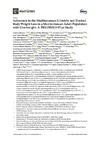Identificador persistente para citar o vincular este elemento:
https://accedacris.ulpgc.es/jspui/handle/10553/73945
| Título: | Adherence to the mediterranean lifestyle and desired body weight loss in a mediterranean adult population with overweight: A predimed‐plus study | Autores/as: | Bouzas, Cristina Bibiloni, Maria del Mar Julibert, Alicia Ruiz‐Canela, Miguel Salas‐Salvadó, Jordi Corella, Dolores Zomeño, Maria Dolors Romaguera, Dora Vioque, Jesús Alonso‐Gómez, Ángel M. Wärnberg, Julia Alfredo Martínez, J. Serra Majem, Luis Estruch, Ramon Tinahones, Francisco J. Lapetra, José Pintó, Xavier Ríos, Antonio García Bueno‐Cavanillas, Aurora Gaforio, José J. Matía‐Martín, Pilar Daimiel, Lidia Martín‐Sánchez, Vicente Vidal, Josep Vázquez, Clotilde Ros, Emilio Fernandez‐Lázaro, Cesar Ignacio Becerra‐Tomás, Nerea Gimenez‐Alba, Ignacio Manuel Muñoz, Julia Morey, Marga Oncina‐Canovas, Alejandro Tojal‐Sierra, Lucas Pérez‐López, Jéssica Abete, Itziar Casañas‐Quintana, Tamara Castro‐Barquero, Sara Bernal‐López, M. Rosa Santos‐Lozano, José Manuel Galera, Ana Angullo‐Martínez, Escarlata Basterra‐Gortari, F. Javier Basora, Josep Saiz, Carmen Castañer, Olga Martín, Marian Notario‐Barandiarán, Leyre Belló‐Mora, María C. Sayón‐Orea, Carmen García‐Gavilán, Jesús Goday, Albert Tur, Josep A. |
Clasificación UNESCO: | 3206 Ciencias de la nutrición | Palabras clave: | Body Image Desired Weight Loss Ideal Weight Mediterranean Lifestyle Obesity, et al. |
Fecha de publicación: | 2020 | Publicación seriada: | Nutrients | Resumen: | Body weight dissatisfaction is a hindrance to following a healthy lifestyle and it has been associated with weight concerns. Objectives. The aim of this study was to assess the association between the adherence to the Mediterranean lifestyle (diet and exercise) and the desired body weight loss in an adult Mediterranean population with overweight. Methods. Cross‐sectional analysis in 6355 participants (3268 men; 3087 women) with metabolic syndrome and BMI (Body mass index) between 27.0 and 40.0 kg/m2 (55–75 years old) from the PREDIMED‐Plus trial. Desired weight loss was the percentage of weight that participants wished to lose. It was categorized into four cut‐offs of this percentage (Q1: <10%, n = 1495; Q2: 10–15%, n = 1804; Q3: <15–20%, n = 1470; Q4: ≥20%, n = 1589). Diet was assessed using a validated food frequency questionnaire and a 17‐item Mediterranean diet questionnaire. Physical activity was assessed by the validated Minnesota‐REGICOR and the validated Spanish version of the Nurses’ Health Study questionnaire. Results. Participants reporting higher percentages of desired weight loss (Q3 and Q4) were younger, had higher real and perceived BMI and were more likely to have abdominal obesity. Desired weight loss correlated inversely to physical activity (Q1: 2106 MET min/week; Q4: 1585 MET min/week. p < 0.001) and adherence to Mediterranean diet (Q1: 8.7; Q4: 8.3. p < 0.001). Conclusions. In older Mediterranean individuals with weight excess, desired weight loss was inversely associated with Mediterranean lifestyle adherence. Deeply rooted aspects of the MedDiet remained similar across groups. Longitudinal research is advised to be able to establish causality. | URI: | https://accedacris.ulpgc.es/handle/10553/73945 | ISSN: | 2072-6643 | DOI: | 10.3390/nu12072114 | Fuente: | Nutrients [EISSN 2072-6643], v. 12 (7), 2114, (Julio 2020) |
| Colección: | Artículos |
Citas SCOPUSTM
27
actualizado el 08-jun-2025
Citas de WEB OF SCIENCETM
Citations
28
actualizado el 15-feb-2026
Visitas
394
actualizado el 15-ene-2026
Descargas
167
actualizado el 15-ene-2026
Google ScholarTM
Verifica
Altmetric
Comparte
Exporta metadatos
Los elementos en ULPGC accedaCRIS están protegidos por derechos de autor con todos los derechos reservados, a menos que se indique lo contrario.
